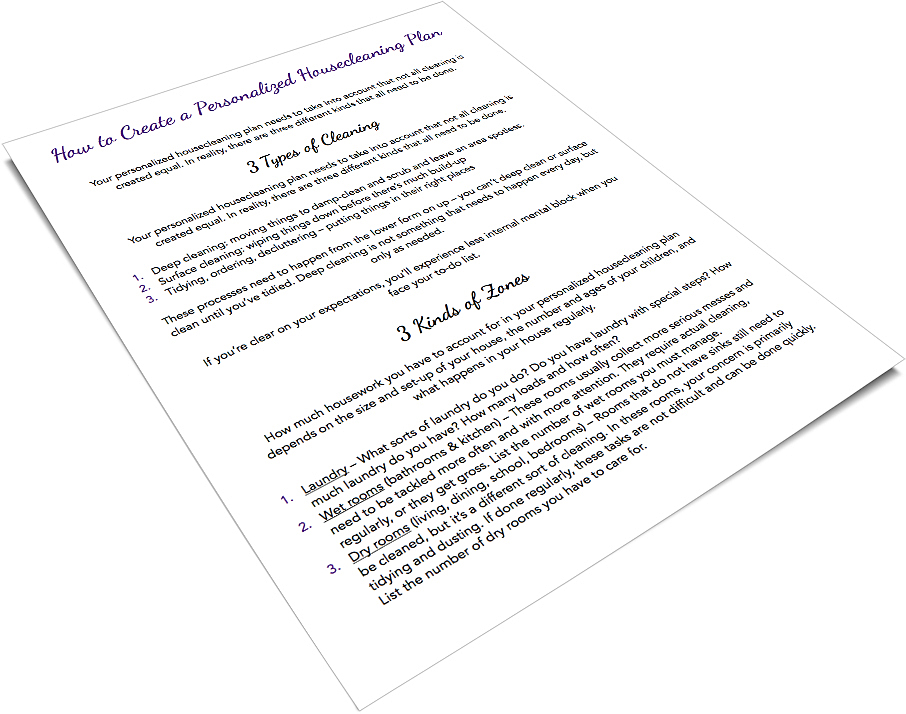
I feel somewhat sheepish being the one to write this post. Charlotte Mason is one of my favorite education authors, but I am not really a “Charlotte Mason” homeschooler. For one, I’m a narration drop-out.
Secondly, I enjoy synthesizing rather than going by someone else’s rules. Miss Mason was all about synthetic knowledge and connections, so I like to think she’d be ok with that.
Part of that synthesizing I really get a kick out of is seeing how education principles actually apply to all of life, across the board.
Hence: Charlotte-Mason-Style Housekeeping
Charlotte Mason’s 20 Educational Principles apply to life in general as well as education in particular. And two of her methods for putting her principles into practice apply quite handily to housework.
These two principles help us not overburden our immature students, and they help them on the road toward relational, poetic knowledge.
It turns out those same methods can also help us immature or flailing homemakers get on in the way of learning to love what must be done.
Charlotte Mason Method: Short lessons.
Charlotte Mason writes,
“Again, the lessons are short, seldom more than twenty minutes in length for children under eight; and this, for two or three reasons. The sense that there is not much time for his sums or his reading, keeps the child’s wits on the alert and helps to fix his attention.”
Short lessons for short students. It’s wise counsel. Even twenty minutes can seem like an eternity to an eight-year-old, but knowing that this particular misery or strain is going to end helps him not despair.
I know the times my students have despaired is when I’ve told them they aren’t done until they get 100% – which they sometimes feel is impossible and so they despair from the outset. If, instead, you can say, “Ok, we’re going to do this thing and give it our best shot for 20 minutes,” it’s easier to overcome that hurdle of starting and the fear of failing.
The same goes for us and our housework. If, instead of saying, “I’m not going to stop until the kitchen is clean,” we say, “I’m going to set the timer for 20 minutes and see how big a difference I can make,” then we’re much more likely to move in with energy and a strong will to tackle the situation.
Going all out for a short time will lead to more progress in the long haul with less grumping and whining, even for moms.
Use a timer and tell yourself you’re only going to do x job or tackle y room for 15 minutes. Then stop! Be done before you burn out and start wandering aimlessly and distractedly.
You can do another 15 or 20 minutes later in the same day, but first apply the second method.

Charlotte Mason Principle: Alternating lessons
“If the lessons be judiciously alternated––sums first, say, while the brain is quite fresh; then writing, or reading––some more or less mechanical exercise, by way of a rest; and so on, the program varying a little from day to day, but the same principle throughout––a ‘thinking’ lesson first, and a ‘painstaking’ lesson to follow,––the child gets through his morning lessons without any sign of weariness.”
Charlotte Mason
Here’s another tip for working with gusto, whether it’s a child and handwriting or a mom and folding laundry.
Don’t work at one job for too long – method #1 – and then after your time is up, do something that is quite different and requires a different set of muscles or eyes or type of energy.
For instance, if you reserve an hour to do housework, do 15 minutes of a high-energy and fast-paced general tidying, then 15 minutes of sitting and paying bills or making phone calls or sorting a desk drawer, then 15 minutes of cleaning bathrooms quick-as-you-can, then 15 minutes of standing to fold laundry or wash dishes, you’ll get more done in that hour than if you just purpose to “clean up” for an hour.
Moreover, you’ll feel better while doing it and thereafter as well!
Working in a concentrated burst for a short time and alternating the sort of work you do helps motivate and reluctant learners as well as reluctant homemakers.
Give it a shot!


Flylady would agree on the short bursts of different tasks.
It also goes to say that if you find yourself with 15 minutes to spare here & there through your day, you can do something productive with that time.